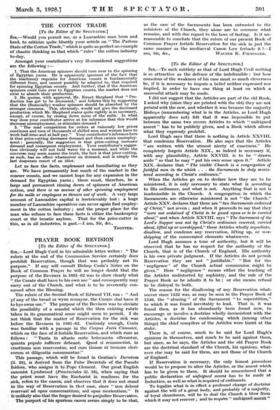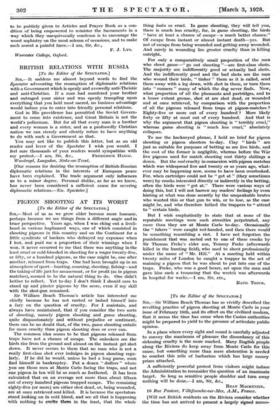[To the Editor of the SPECTATOR.1
SIR,—To such subtlety as that of Lord Hugh Cecil nothing is so attractive as the defence of the indefensible : but how conscious of the weakness of his case must so much cleverness be, if it is necessary to impute a belief neither expressed nor implied, in order to have one thing at least on which a successful attack may be made.
I did not suggest that the Articles are part of the old Book. I asked why (since they are printed with the old) they are not printed with the new, and whether it was because the majority Bishops (remembering what is in the Articles, as Lord Hugh apparently does not) felt that it was impossible to put between the same two covers Articles to which " unfeigned assent " has to be publicly given, and a Book which allows what they expressly prohibit.
Lord Hugh says that there is nothing in Article XXVIII. that condemns Reservation. He also says that the Articles " are written with the utmost nicety of exactness." He completely forgets Article XIX., as indeed is necessary if, with any plausibility, Article XXVIII. is to be "drawn aside " so that he may " put his own sense upon it." Article XIX. declares that "The visible Church is a congregaticin of faithful men in the which . . . the Sacraments be duly minis- tered according to Christ's ordinance."
When the Articles go on to declare how they are to be ministered, it is only necessary to state what is according to His ordinance, and what is not. Anything that is not is inadmissible in the Church. A congregation in which the Sacraments are otherwise ministered is not " the Church." Article XXV. declares that there are " two Sacraments ordained of Christ," not seven ; and when it proceeds to say that they "were not ordained of Christ to be gazed upon or to be carried about," and when Article XXVIII. says " The Sacrament of the Lord's Supper was not by Christ's ordinance reserved, carried about, lifted up or worshipped," these Articles wholly repudiate, disallow, and condemn any reservation, lifting up, or wor- shipping of the consecrated elements whatsoever.
Lord Hugh assumes a tone of authority, but it will be observed that he has no respect for the authority of the Church, that is of the Church of England. His authority is his own private judgment. If the Articles do not permit Reservation they are not " justifiable." " But for the '
negligence' of the Church actual communion might be given." Here " negligence " means either the teaching of the Articles undistorted by sophistry, and the rule of the Prayer Book as he admits -it to be ; or else means refusal to be disloyal to both.
The reason for the disallowing of any Reservation what- soever since 1552 was, as may be seen in the Prayer Book of 1549, the " abusing " of the Sacrament " to superStition," to which it was found inevitably to lead. That is, it was found then, as it has abundantly been found now, to encourage or involve a doctrine wholly inconsistent with the Articles, a doctrine for condemning which (among other things) the chief compilers of the Articles were burnt at the stake.
There is, of course, much to be said for Lord Hugh's opinions in themselves, and much to be said against them, but since, as he says, the Articles and the old Prayer Book are the doctrinal standard of the Church, his opinions, what- ever else may be said for them, are not those of the Church of England.
If Reservation is necessary, the only honest procedure would be to propose to alter the ATticles, or the assent which has to be given to them. It should be remembered that a public declaration of unfeigned assent has to be made at Induction, as well as what is required of ordinands. To legalize what is in effect a profound change of doctrine against the will of a great body, and probably of a majority, of loyal churchmen, will be to deal the Church a blow from which it may not recover ; and to require " unfeigned assent " to be publicly given to Articles and Prayer Book as a con- dition of being empowered to minister the Sacraments in a way which they unequivocally condemn is to encourage the worst sophistry on the most solemn of occasions, and to make such assent a painful farce.—I am, Sir, &c., Worcester College, Oxford. F. J. Lys.































































 Previous page
Previous page